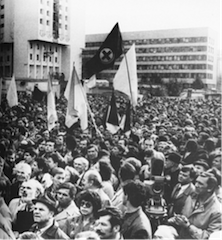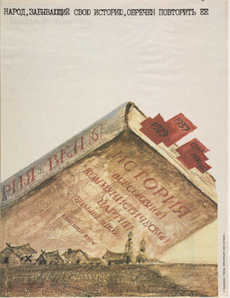

|
Perestroika and Glasnost  Perestroika rally, Ukraine Gorbachev began with a model of reform close to Andropov's with its emphasis on improving workplace discipline and accelerating economic growth. On 4 April 1985 the government announced a virtual prohibition, tripling vodka prices and reducing wine and beer production by 75 per cent. But the country's alcoholics merely turned to the black market in cheap and dangerous brands of vodka and moonshine. Reform took a more serious turn with the introduction of perestroika, the radical restructuring of the economy and political system. The 1987 Law on State Enterprises loosened state controls on wages and prices in the hope of stimulating productivity. From 1988 cooperatives were allowed to set up cafés, restaurants and small shops. But these measures failed to ease consumer shortages. Gorbachev presented perestroika as a 'revolution' in socialist thinking, justifying it in terms of Lenin's writings (mainly from the NEP) at every turn. He called for more democracy, with genuine elections of Party officials, talked about the need for 'pluralism', a taboo word in the Bolshevik dictatorship, and urged the Party to return to the 'humanism' of its founders. In foreign policy this 'new thinking' meant renouncing the Cold War ideology of international struggle for the promotion of 'universal human values' and a more practical approach towards disarmament. Renouncing the Brezhnev Doctrine, Gorbachev announced to the East European leaders that they were on their own: Moscow would not intervene to help them if they failed to win the support of their people, which he hoped they would do through perestroikas of their own.  A people who forgets its history will repeat it. Short Course (History of the Party) EXTRACT FOR SUBSCRIBERS ONLY. Orlando Figes, Revolutionary Russia, 1891-1991 (Pelican, 2014), pp. 393-95. Glasnost ['openness'] was the really revolutionary element of the Gorbachev reforms, the means by which the system unravelled ideologically... [FULL TEXT 446 WORDS] |
© 2014 Orlando Figes | All Rights Reserved